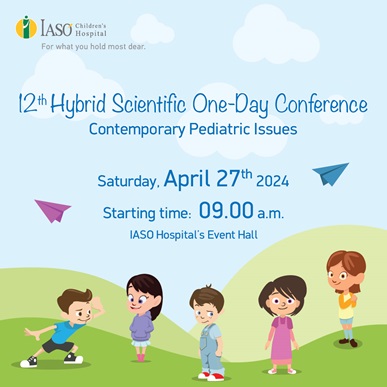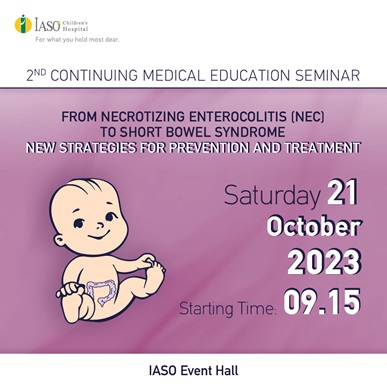
Neurology
Pediatric Sector
Call center
210 638 3000 Pediatric Neurology or Child Neurology deals with the diagnosis and treatment of diseases and disorders of the Nervous System in children and adolescents (0-18 years).
The Pediatric Neurology Department provides the following services:
- Outpatient Service with prescheduled appointments
- Emergency Service for evaluation of acute problems during regular working hours
- In-hospital stay for diagnostic and therapeutic purposes
- Electroencephalography (EEG) Lab
- Liaison Service to meet the demands of inpatients
The Department examines and treats infants, children and adolescents exhibiting a great variety of neurological and neurodevelopmental disorders. Most of these disorders are of minor or moderate severity and require routine care by pediatric neurologists and related medical and therapeutic specialties. For the most severe disorders there are newer and continuously evolving methods for their pharmaceutical, surgical or other types of management, which improve the disease outcome and quality of life of our children.
The disorders covered by a pediatric neurologist are classified as follows:
- Diagnosis, monitoring and treatment of children with problems during their neonatal period
- Follow up of neonates in high risk for future neurodevelopmental disorders (e.g. due to pre-term birth), aiming at the timely diagnosis of potential deviations and the early therapeutic intervention
- Central Nervous System malformations
- Congenital anomalies and malformation syndromes, such as chromosomal abnormalities, Angelman syndrome, Rett syndrome, etc.
- Cranial and cervical spine disorders affecting the Central Nervous System: Syndromic and non-syndromic craniosynostoses, Chiari I syndrome, etc.
- Hydrocephalus
- Cerebral palsy: Diagnosis and differential diagnosis, treatment and rehabilitation. Botulinum toxin injections in patients with spasticity and dystonia.
- Neuroectodermal syndromes, such as neurofibromatosis, Tuberous Sclerosis, etc.
- Neurometabolic and neurodegenerative disorders of the Central Nervous System.
- Abnormal involuntary movements: Tics, Tourette syndrome, Chorea, Paroxysmal dyskinesias, Primary dystonias, etc
- Infections of the Central Nervous System (Meningitis, Encephalitis, Meningoencephalitis)
- Demyelinating disorders: Multiple sclerosis, Acute disseminated encephalomyelitis (ADEM)
- Parainfectious and metainfectious disorders, such as acute transverse myelitis, acute cerebellar ataxia, etc
- Autoimmune encephalitides
- Rheumatic and other inflammatory disorders with nervous system involvement.
- Traumatic encephalopathies
- Toxic encephalopathies
- Hypoxic-ischemic encephalopathies due to drowing, asphyxia, etc
- Tumors and other space-occupying lesions
- Vascular diseases of the Central Nervous System, such as Arteriovenous malformations, Cavernomas, etc
- Epilepsies and other disorders characterized by seizures
- Paroxysmal disorders other than epilepsies (breath-holding spells, syncopal episodes, benign paroxysmal torticollis, etc)
- Migraines and other child and adolescent headaches
- Disorders of the optical, auditory and vestibular systems
- Neuromuscular diseases: Spinal muscular atrophy, Inherited peripheral neuropathies (Charcot-Marie-Tooth, etc), postinfectious polyneuropathy (Guillain-Barré syndrome), Chronic inflammatory demyelinating polyneuropathy, etc
- Muscular diseases: Muscular distrophies, Congenital myopathies, Myotonias, Metabolic myopathies, Inflammatory myopathies, Myasthenia and myasthenic syndromes, etc
- Neurologic manifestations of systemic diseases, nutrition, electrolytes and acid-base balance disorders
- Developmental delay and mental retardation
- Autism spectrum disorders
- Attention deficit disorder and Hyperactivity
- Specific learning disorders – Dyslexia, etc
- Sleep disorders
What patients expect from us:
- Outpatients are served both by morning and afternoon appointments.
- Patients suffering from acute or chronic conditions can get prescriptions using EOPYY (National Organization for the Provision of Healthcare Services), medical certificates for KEPA (Disability Certification Centers) and opinions on their clinical status, and written medical reports of electroencephalograms (EEGs).
- The pediatric neurologists are surrounded by other medical specialties which are essential in the exercise in their function, such as neuroradiologists, neurosurgeons, geneticists, pediatric orthopedic specialists and other specialists, all of whom possess exceptionally high scientific standards knowledge. This close collaboration ensures immediate and successful treatment of even the most complex pediatric neurology problems.
- In addition to proper diagnosis and treatment of our patients, our objective is the close communication with the pediatrician or the GP, as well as the provision of detailed information on the child’s condition to the families who entrust the care of their children to us.
Information









